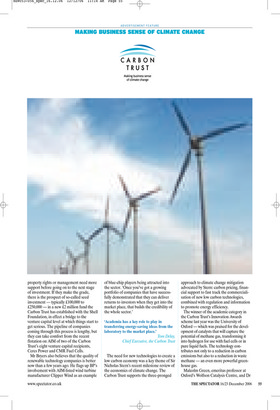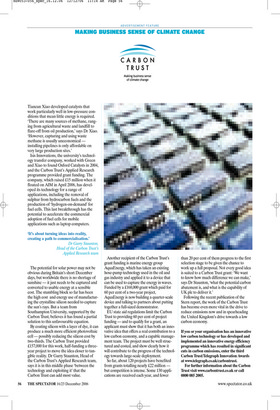‘Academia has a key role to play in transferring energy-saving
ideas from the laboratory to the market place.’ Tom Delay, Chief Executive, the Carbon Trust The need for new technologies to create a low carbon economy was a key theme of Sir Nicholas Stern’s recent milestone review of the economics of climate change. The Carbon Trust supports the three-pronged approach to climate change mitigation advocated by Stern: carbon pricing, financial support to fast track the commercialisation of new low carbon technologies, combined with regulation and information to promote energy efficiency.
The winner of the academic category in the Carbon Trust’s Innovation Awards scheme last year was the University of Oxford — which was praised for the development of catalysts that will capture the potential of methane gas, transforming it into hydrogen for use with fuel cells or in pure liquid fuels. The technology contributes not only to a reduction in carbon emissions but also to a reduction in waste methane — an even more powerful greenhouse gas.
Malcolm Green, emeritus professor at Oxford’s Wolfson Catalysis Centre, and Dr Tiancun Xiao developed catalysts that work particularly well in low-pressure conditions that mean little energy is required. ‘There are many sources of methane, ranging from agricultural waste and landfill to flare-off from oil production,’ says Dr Xiao. ‘However, capturing and using waste methane is usually uneconomical installing pipelines is only affordable on very large production sites.’ Isis Innovations, the university’s technology transfer company, worked with Green and Xiao to found Oxford Catalysts in 2004, and the Carbon Trust’s Applied Research programme provided grant funding. The company, which raised £15 million when it floated on AIM in April 2006, has developed its technology for a range of applications, including the removal of sulphur from hydrocarbon fuels and the production of ‘hydrogen-on-demand’ for fuel cells. This last breakthrough has the potential to accelerate the commercial adoption of fuel cells for mobile applications such as laptop computers.







































































































































 Previous page
Previous page